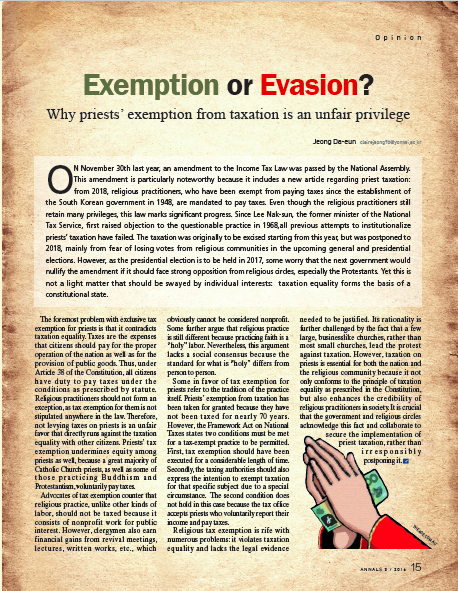Why priests’ exemption from taxation is an unfair privilege

ON NOVEMBER 30th last year, an amendment to the Income Tax Law was passed by the National Assembly. This amendment is particularly noteworthy because it includes a new article regarding priest taxation: from 2018, religious practitioners, who have been exempt from paying taxes since the establishment of the South Korean government in 1948, are mandated to pay taxes. Even though the religious practitioners still retain many privileges in many aspects, this law shows significant progress. Since Lee Nak-sun, the former minister of the National Tax Service, first raised objection to the questionable practice in 1968,all previous attempts to institutionalize priests’ taxation have failed. The taxation was originally to be excised starting from this year, but was postponed to 2018, mainly from fear of losing votes from religious communities in the upcoming general and presidential elections. However, as the presidential election is to be held in 2017, some worry that the next government would nullify the amendment if it should face strong opposition from religious circles, especially the Protestants. However, this is not a light matter that can be swayed by individual interests because taxation equality forms the basis of a constitutional state.
The foremost problem with exclusive tax exemption for priests is that it contradicts taxation equality. Taxes are the expenses that citizens should pay for the proper operation of the nation, as well as for the provision of public goods. Thus, under Article 38 of the Constitution, all citizens have duty to pay taxes under the conditions as prescribed by statute. Religious practitioners are also not an exception, as tax exemption for them is not stipulated anywhere in the law. Therefore, not levying taxes on priests is an unfair favor that directly runs against the taxation equality with other citizens. Priests’ tax exemption undermines equity among priests as well, because a great majority of Catholic Church priests, as well as some of those practicing Buddhism and Protestantism, voluntarily pay taxes.
Advocates of tax exemption rebut that religious practice, unlike other kinds of labor, should not be taxed because it consists of nonprofit work for public interest. However, clergymen also earn financial gains from revival meetings, lectures, written works, etc., which obviously cannot be considered nonprofit. Some further argue that religious practice is still different because practicing faith is a “holy” labor. Nevertheless, this argument lacks a a social consensus because the standard for what is “holy” differs from person to person.
Some in favor of tax exemption for priests refer to the tradition of the practice itself. Priests’ exemption from taxation has been taken for granted because they have not been taxed for nearly 70 years. However, the Framework Act on National Taxes states two conditions should be qualified for a tax-exempt practice to be permitted. Firstly, tax exemption should have been executed for a considerable length of time. Secondly, the taxing authorities should also express the intention to exempt taxation for that specific subject due to a special circumstance. The second condition does not hold in this case because the tax office accepts priests who voluntarily report their income and pay taxes. Religious tax exemption is rife with numerous problems including the violation of taxation equality and lack of legal evidence needed to be acknowledged as a justified practice. Its rationality is further questioned by the fact that a few large, businesslike churches, rather than most small churches, lead the protest against taxation. However, taxation on priests is essential for both the nation and the religious community because it not only abides by the principle of taxation equality as prescribed in the Constitution, but it also enhances the credibility of religious practitioners in society. It is crucial that the government and religious circles acknowledge this fact and collaborate to secure the implementation of priest taxation, rather than irresponsibly postponing it.
Jeong Da-eun
clairejeong96@yonsei.ac.kr

